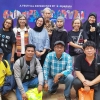The Montara oil spill in the waters of the Timor Sea in 2009 caused losses to around 15,000 seaweed farmers in East Nusa Tenggara (NTT) and disrupted the marine ecosystem. The Indonesian government in this case adhered to the principle of peaceful dispute resolution and filed a claim and demanded compensation for the impacts caused by the oil spill. In handling this case, Indonesia can utilize the International Maritime Organization (IMO) as the main platform to achieve national interests in the maritime domain. Some of the benefits of Indonesia's involvement in the IMO in the context of this case include capacity building, decision-making, driving cooperation, and global influence. Through continued participation in IMO, Indonesia can be a driver for member states to explore further cooperation potential, intensify information exchange, and develop joint initiatives in maritime risk mitigation. Thus, Indonesia's involvement in IMO can make a significant contribution in handling the Montara oil spill case in the waters of the Timor Sea, as well as strengthening Indonesia's role in global maritime dynamics.
The benefits of the IMO (Intergovernmental Maritime Organization) in the case of Montara oil include several important aspects, such as:
1. International Maritime Law provisions: IMO provides legal confidentiality which is the basis for handling Montara oil pollution cases. The 1982 Law of the Sea Convention is one of the provisions of international law which is a reference in resolving disputes over marine oil pollution in the Timor Sea.
2. State Accountability: IMO provides a framework for state accountability for oil pollution. In the case of montara oil pollution in the Indonesian Sea, Thailand is responsible for montara oil pollution in the Indonesian Sea
3. Research and Experience: IMO provides great benefits in gaining more knowledge and experience in dealing with technical and legal issues related to oil pollution.
4. Oil Spill Response Cooperation: IMO allows countries and the private sector to cooperate in oil spill response. In the case of Montara oil pollution in the Timor Sea, Indonesia collaborated with PT Leadership Indonesia in education and training of human resources or the latest techniques/technology, procedures and international protocols for dealing with oil spills
5.In the case of Montara oil pollution, the benefits of IMO lie in the application of international legal provisions, state accountability, research, experience and cooperation in dealing with oil spills to deal with the problem of Montara oil pollution and protect the marine environment.
In the case of montara oil spill in the waters of Indonesia, there are several benefits that come from the imo (intergovernmental maritime organization) handling the oil pollution problem. Some of these benefits include the application of provisions of international law, accountability, research, experience, and cooperation in addressing the problem of oil pollution and protecting the Marine environment. In addition, imo can also help in strengthening cooperation between Indonesia and the west, especially in regard to handling the problem of oil pollution and Marine protection. In context of international relations, the imo's benefits of montara oil spill can help to increase cooperation and strengthen diplomatic relations between Indonesia and the west in terms of ocean environmental protection and the treatment of oil pollution problems.
The benefits of IMO (intergovernmental maritime organization) in the case of Montara oil spill in the marine waters of Timor, Indonesia, among others: technical assistance and resources in handling environmental impact: IMO can provide technical assistance and resources to help Indonesia in handling environmental impacts due to spont of spine of Montara, including in terms of cleaning and recovery of the marine environment. International Cooperation: Through IMO, Indonesia can cooperate with other countries and international institutions to address the effects of oil spills effectively, and strengthen cooperation in the marine environmental protection and handling of oil pollution issues. Implementation of International Standards: IMO promotes the application of international standards in terms of cash shipping and marine environmental protection, which can help prevent recurrence of similar incidents in the future. Experience and Research: IMO can provide experiences and research related to oil handling of oil and sphere of environmental, which can help Indonesia in developing more effective policies and strategies. With the imagination of IMO, it is expected that the treatment of cast spill oil can be done effectively and sustainably, and strengthen international cooperation in protecting the marine environment.
The IMO (intergovernmental maritime organization) helps in completing the cattle of Montara oil spill in the marine waters of Timor, Indonesia, providing several benefits including: Implementation of international legal provisions: IMO provides international legal provisions that help investigate the environmental pollution case, such as LLEI regarding pollution environment of maritime borders (Marpol) and LLEIs on the safety of the voyage. International Cooperation: IMO allows cooperation between international countries and agencies, such as Australia and Indonesia, to assist in completion of sea-pollution cases, including environmental impact management, cleaning, and environmental restoration. State Accountability: IMO ensures that the state involved in pollution cases, such as Australia, has a responsibility to overcome the negative impact of the spont of oil and mortal oil. Research and Experience: IMOs can provide research and experience related to the management of environmental impacts and environmental protection, which can help Indonesia in developing more effective policies and strategies. By utilizing the implementation of the IMO, the sea pollution case in the Timor Sea due to the spray of Montara oil can be underwheld and sustainable, and strengthen international cooperation in protecting the marine environment.
In the case of the Montara oil spill in the waters of the Timor Sea, Indonesia can utilize the International Maritime Organization (IMO) as the main platform to achieve national interests in the maritime domain. Some of the benefits of Indonesia's involvement in the IMO in the context of this case include:
1. Capacity Building: Through continued participation in the IMO, Indonesia can develop its capacity in maritime affairs and build strong collaborative networks with other member states.
2. Decision Making: By continuing to delve into the policies and rules of the IMO, Indonesia can ensure that it has an in-depth understanding of the international legal framework governing maritime issues, and can respond effectively to any similar cases in the future.
3. Encourage Cooperation: Utilizing the IMO as a key platform to address maritime issues will have a widespread positive impact on Indonesia's maritime strength. By increasing active engagement in this international forum, Indonesia can gain greater access to relevant resources, technologies and best practices.
4. Global Influence: Through continued participation in the IMO, Indonesia can serve as an impetus for member states to explore further potential for cooperation, intensify information exchange, and develop joint initiatives in countermeasures.
The case of the montara oil spill in the waters of the timor sea has a significant international relation, particularly between Indonesia and Australia. The case highlights the urgency of addressing international levels of Marine pollution issues. The impact of the montara oil spill has contaminated some 90,000 square miles [90,000 sq km] of timorese sea and killed more than 100,000 people who farm seaweed and fishermen in the east southeast nusa. Revenues from kelp and fishermen in the timor sea dropped between 50% and 85%, leading to significant social and economic costs. In the completion of the case, Indonesia and Australia continue to undertake numerous diplomatic efforts. In 2018, minister coordinator of field coordinator luhut binsar pandjaitan formed a montara task force of six people. At the end of 2019, the county lawyer foundation appointed an attorney from England to encourage the Australian government to rush to negotiate the case. The case also suggests that Indonesia and Australia's relationship patterns are mutually reinforcing, so both countries strive to maintain a stable relationship. However, the completion of the case also indicates that handling of deep-sea pollution issues at an international level requires close cooperation between countries and international organizations, such as the international maritime organization (imo), to achieve a just and sustainable solution. Thus, the case of the montara oil spill in timor sea waters has broad implications in the context of international relations, cross-country disputes, and global ocean environmental protection.
Penulis bernama Muhammad Rakha Pangestu Putra Yudanto, penulis merupakan mahasiswa Universitas Teknologi Yogyakarta prodi ilmu Hubungan Internasional akreditasi "B", penulis merupakan mahasiswa angkatan 2022. Alasan penulis mengambil prodi Hubungan Internasional karena penulis tertarik untuk mempelajari dunia internasional mulai dari hubungan antar negara, budaya negara lain, hingga hukum internasional. Penulis menulis artikel tersebut untuk mata kuliah Politik Luar Negeri Indonesia. Ada pun beberapa dosen yang sangat membantu penulis dalam mengikuti mata kuliah yaitu Bapak Muhammad Ridha Iswadhana, S.I.P., M.A. dan Ibu Lucitania Rizky, S.I.P., M.A. penulis berencana untuk mengambil konsentrasi Diplomasi bisnis pada semester 4.
Reference:
https://ejournal.unsrat.ac.id/v3/index.php/lexprivatum/article/download/29794/28851
https://jurnal.untan.ac.id/index.php/jmfh/article/view/4130/4160
Baca konten-konten menarik Kompasiana langsung dari smartphone kamu. Follow channel WhatsApp Kompasiana sekarang di sini: https://whatsapp.com/channel/0029VaYjYaL4Spk7WflFYJ2H







